Back to School: clear-out of links
August 31, 2010 | Comments- Lessons learned at Dropbox and Xobni, going from zero to a million users;
- Nice sample of a clean, easy-to-read contract;
- 157 app stats you need to know about;
- Three reminders about platform businesses, very clear and concise warnings;
- How I feel about downloading apps, ho ho. Android only I presume.
- MeeGo are having a conference in Dublin this November. I hope to be there...
- iAd may not be cost effective for developers; I'm really interested in learning how the production costs compare to response rates for these ads. I just don't get how they can be competitive with low-effort text and banner ads, if you're measuring responses;
- Why Smartphone adoption may not be as big as you think, decoupling adoption from growth rates;
- SquareUp looks interesting. I'm looking forward to seeing it in the wild;
- The Manifesto for Half-Arsed Software Development: "That is, while the items on the left sound nice in theory, we’re an enterprise company, and there’s no way we’re letting go of the items on the right.". I think you could apply most of this to businesses other than large enterprises, mind...
- Management lessons I learned at Apple, I found this extremely interesting given how little I've read of how Cupertino do their stuff;
- Mediocre advertising can now be produced automatically. Well that's the ad industry fucked then.
Upcoming events
August 25, 2010 | CommentsI'm on holiday this week, having a fight with my attic. But before it's too late, here's a few places I'll be showing my face over the coming months:
- I'm speaking at Mobile Monday Amsterdam on 6th September, sandwiched between Rick le Roy and Matt Webb. We're talking about design and mobile. I'll likely go straight to nuts and bolts and talk about a few things we've launched recently, how we've approached them, and where we messed up.
- Then it's to Over The Air, which returns to Imperial College on 10th and 11th September. I'm sitting on a panel Bryan Rieger is running, tentatively titled "What Would Picasso Do?". We're going to be talking about art and mobile, then it's heads down for the overnight hacking.
- On 14th December I'll be taking part in a panel session at Nokia Developer Summit, titled "Simply clever – what Designs and Experiences make the user click?";
- Come October, I'm going to form part of the business track of DroidCon, the UKs first Android-focused conference running in London on 28-29th. I'll likely be presenting a warts-and-all case study of Future Platforms: our experiences building and operating a business in mobile over the last 10 years. As part of this I'll be talking about some of the problems we've faced: what should you do when Noel Edmonds kidnaps your project manager in launch week? How can you best handle the pervert in the flats opposite who keeps exposing himself to your staff? And other vital issues facing digital agencies in the 21st century.
- Finally, I'm going to be saying something, about something, at openMIC #8, which is coming to Brighton on 4th November. I've shamefully failed to make it along to any of the other openMIC events in Bristol or elsewhere, so really looking forward to making amends at this one.
A little birdie suggests that I may also be in Dublin in November to run a heavily customised version of the Mobile Mountains workshop (which I only recently swore I'd never run again). If so, we'll be digging up the corpse and reanimating it, Robocop-style. It will be better. Faster. Stronger. And fight crime. I'll post here if that's going to happen.
Oh, and I'm really looking forward to UX Brighton 2010: Rory Sutherland would have been enough to drag me along, and I've never seen Eric Reiss talk, but there's a great cast of other speakers there, most of whom I've never seen on stage.
Last but not least, I'm also helping judge the BIMAs this year. I did this way back in 2002 and it was a lot of fun, I'm really looking forward to it again.
Update: added in the Nokia Developer Summit panel.
In Which Tom Looks Forwards And Backwards Through His Spit
August 18, 2010 | CommentsTowards the end of last year I read 59 Seconds by Richard Wiseman, a book which takes a scientific approach to debunking some self-help myths and suggests some alternative methods for motivating and incenting oneself. As part of trying these suggestions, I promised myself that if I achieved A Certain Something, I'd treat myself to a DNA test from 23andme.
I completely failed to do most of the things that would've earned me such rewards, including A Certain Something, then World DNA Day came around, 23andMe dropped their prices considerably for 24 hours only, and I bought it anyway.
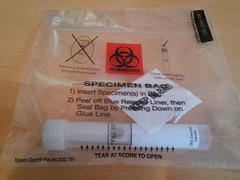 A week or so later, a rather smart-looking package arrived. Whilst the unboxing experience won't bring tears to any eyes in Cupertino, 23andMe have clearly thought through how to dress a slightly unpalatable medical process in consumer-friendly clothes. I signed up with the web site, clicking past umpteen disclaimers to promise that no, I wasn't going to consider this as medical advice and yes, I did understand that I might learn unpleasant things about myself.
A week or so later, a rather smart-looking package arrived. Whilst the unboxing experience won't bring tears to any eyes in Cupertino, 23andMe have clearly thought through how to dress a slightly unpalatable medical process in consumer-friendly clothes. I signed up with the web site, clicking past umpteen disclaimers to promise that no, I wasn't going to consider this as medical advice and yes, I did understand that I might learn unpleasant things about myself.
The dirty business of filling a tube with saliva followed. 23andMe were terribly helpful and reassuring when it came to this bit: most people apparently "take between 2 and 5 minutes to deliver a saliva sample", and I'm delighted to report that in this respect I'm absolutely average. I relaxed, rubbed my cheeks gently, and within a mere 210 seconds had delivered the required quantity of slobber. Tube sealed, packaged into a fearsome-looking "biohazard"-labelled bag, and posted back to the USA.
About 6 weeks later, The Email Arrived: my results were in. I'll confess to a small feeling of trepidation as I tapped in username and password, and dug into the data. And there's a *lot* of data.
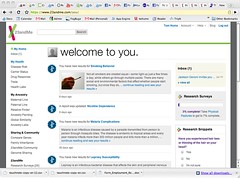
It's broken down into what I'd consider two major sections - "My Health" and "My Ancestry" - and a couple of other bits: "Sharing & Community" and "23andWe". I zeroed in immediately onto "My Health", with bated breath... and was quietly happy with the hand it appears I've been dealt. No horrendous nasties, but a greater than average risk of the terrifying-sounding "venous thromboembolism" (blood clots basically - my dad's had this sort of trouble in the past, so no surprise) and just-slightly inflated risk of Type 2 Diabetes and colorectal cancer. Just as happily, I was pleased to read that my risks of Crohn's disease, Multiple Schlerosis and melanona are all reduced.
Best of all, I have a massively low risk of "Restless Legs Syndrome": "Imagine what it would be like to crawl into bed every night, ready to catch some much-needed Zs, only to be struck by an irrepressible urge to move your legs as soon as you began to relax. No matter how tired you were, instead of drifting off peacefully, you would be compelled to get up and move around. It may sound crazy, but this is exactly the situation people with restless legs syndrome (RLS) experience."
They lock some of the extra-frightening stuff behind additional bars. Effectively, you have to say "yes I'm sure" before you find out your risk of, say, Parkinson's. I did, and mine is no higher than normal.
I've given the ancestry side of things less attention; it's something I'll come back to, but it doesn't excite my inner hypochondriac as much as the health stuff. One really interesting titbit, though: they show you maps of where your maternal and paternal haplogroups lived 500 years ago, and do so because before that time people very rarely moved. Where your ancestors were back then is where they probably lived for a long time before. Bloody obvious of course, but we've lost that link between people and place in the last few centuries.
There are social elements to the site, too, helping you find relatives and potentially share data with them. I've said hi to a couple of 4th cousins, but I'm not interested enough in genealogy (right now) to pursue this side of things much, Maybe later.
There's also potential to contribute: surveys collect data which can then be cross-referenced with the corpus of data that 23andMe are collecting to help them pattern-match and draw their own conclusions. I get a warm fuzzy feeling from doing this myself, and even better: it's really easy. And the site regularly updates me with new things that they've learned from that tube of spit I posted them earlier in the year: either conclusions drawn from 23andMe data alone, or from external sources.
23andMe looks credible and well-researched to me, but I'm no scientist (everything I know about genetics I forgot during GCSE biology) and I wanted to get an expert opinion; so I called on a friendly quack and a chum who's qualified in genetics to see what they thought of it. They were generally positive on the presentation. There are plenty of references, many of them to reputable journals like Nature, and whilst we found one or two duplicate studies in a wander around my data, this side of things seemed solid. The conclusions which are low-confidence are labelled as such, and the site uses a credible mechanism for stating your health risks (the odds calculator compares your risk in 1000 folks of comparable ethnicity to the average). The quack pondered on how much of the illness risk came from genes and how much from environment, and the geneticist made some very detailed arguments (which I can't fully recall well enough to express them meaningfully here) about how conclusions couldn't be realistically drawn from looking at specific SNPs.
For myself, I don't feel that my taking these risks seriously carries any risk in itself: the health advice given is good, common-sense stuff: mention PVT to doctors before having an operation, get screened for cancer when I turn 50, exercise, keep my weight down, drink moderately, eat reasonably, don't smoke... all things one should do anyway.
A few people I've spoken to about this have raised privacy concerns: how do I feel about having this data known about me? What if it falls into the wrong hands? I've realised I feel oddly detached from it: my genomes and the conclusions you can draw from it may be the most personal information that exists about me anywhere, but it's so close-up and mechanical that I don't really feel I need to keep it private. It's a bit like showing your friends photos of your genitals: if they've been taken with an electron microscope, they're not porn any more and it's OK.
23andMe let you download your raw genome data; after some experiments generating sound from various data source last year, this got my cogs whirring. I have a really strong desire to make a game which involves exploring my genes, I need to have a think about that one.
How much raw genetic data am I? 5 megabytes, zipped. That's a humbling quantity; you can fit 200 of me onto a cheapo USB stick. On the bright side, the unzipped version is about 15 megabytes. Turns out I'm significantly less redundant than the English language :)
Playgroup 2010
August 16, 2010 | Comments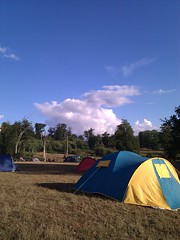 I've just spent a long weekend, and my first few nights under canvas in 2010, at the wonderful Playgroup Festival.
I've just spent a long weekend, and my first few nights under canvas in 2010, at the wonderful Playgroup Festival.
It was kinda special; Playgroup are a little collective of Brighton folks who put on interesting themed club nights (like the Blind Tiger Speakeasy). Somehow they managed to get the use of some land out past Crowborough, and constructed a small but perfectly formed event to hold on it. It was advertised in an unusual fashion: the line-up and location were both kept secret, the former until a couple of days before (I suspect they saved it to drive last-minute ticket sales), the latter right until arrival: we boarded a Big Lemon bus in Brighton with no idea of where we were headed.
Even the journey itself was a bit of an adventure: I met up with Ellen and we trundled down to the Pav Tav to collect our tickets. Arriving a little late for the bus, we bumped into Amy of Young Hanoverians fame and delicately applied the miniscule amounts of peer pressure necessary to persuade her to come along. Someone naughty had managed to find their way into a spare bus which had been abandoned by its driver, so we camped out there for a little while before mounting our actual steed, meeting and greeting a few of the other folks who were coming along.
The setting was idyllic: set on a rolling pasture surrounded by woods, with the borders less aggressively policed than some festivals I've been to. You could happily meander off and go for a wander, particularly if there weren't any security folks looking in your particular direction at the time.
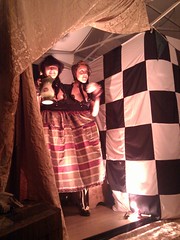 The first night we camped out at the Victorian Freak-show which Jake Spicer and Ophelia Fancy were putting on. Amy kicked off the evening by shouting at everyone in German, reading a poem about fucking a dolphin and forcing us all to play stick-in-the-mud - a challenging game within the confines of a 20 foot square tent. Ms Dubberley Made Herself Apparent. Then the freaks themselves paraded before us, eliciting gasps of horror and whoops of approval, topped with the occasional inappropriate proposition from the less well-bred members of the audience. Bravo to all concerned.
The first night we camped out at the Victorian Freak-show which Jake Spicer and Ophelia Fancy were putting on. Amy kicked off the evening by shouting at everyone in German, reading a poem about fucking a dolphin and forcing us all to play stick-in-the-mud - a challenging game within the confines of a 20 foot square tent. Ms Dubberley Made Herself Apparent. Then the freaks themselves paraded before us, eliciting gasps of horror and whoops of approval, topped with the occasional inappropriate proposition from the less well-bred members of the audience. Bravo to all concerned.
I retired shortly after all this excitement, my nerves shattered and my mind twisted out of shape by the horrors I'd witnessed. Actually, I felt a bit ill, but it passed quickly and by the next day I was chipper once more.
Saturday started slowly, with a full breakfast from the cafe, followed by half an hour getting stuck into Soldiers and Ghosts back at the campsite. A short spell of rain tapping against the outer canvas set me snoozing, but I woke up in time to wander over to the clowning workshop, led by Danny and a few chums down from a clown school in London. We warmed up with some fun exercises, including "The Samurai Game" (which tickled me for aikidocal reasons), and producing an 8-person sex machine: a pulsing, synchronised loop of individual carnal motions contributed by each one of us, the speed of which was controlled by Danny "conducting" the machine. This all broke the ice and got us pretty comfortable in each others company, and was a great lead-in to the main event: donning the classic red nose and performing a song in front of the group, whilst slowly sitting down onto a balloon until it burst. This one was surprisingly tough - we were strongly encouraged to make eye contact with every member of our audience throughout our performance. There was nowhere to hide, no space for embarrassment over your vocal abilities to creep into. I've a new respect for clowns, cemented by a later conversation with one of the workshop attendees who'd been attending a militaristic-sounding mime school. 5 hours training a day? For 3 years? Jeepers.
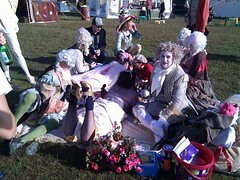 I'd had a laugh, made a fool of myself, and warmed up physically, which really set me up for the rest of the day. We wandered back to the tents and got costumed up; like most Britons, we needed only the barest excuse to don animal outfits. Donkey and mouse soon busied themselves meandering from stall to band to stall to tent to band to stall. On the way through I drank my first chai (mmm chai), bumped into some Unexpected And Most Welcome Chums, and experienced the most sharply off-kilter experience of my life. Never again will I cradle a red pig wrapped in swaddling clothes to my ear as a French Fop sings beautiful songs about soup down a hose attached to its umbilicus. Then bands and dancing, with particular thanks to Carnival Collective, Brighton stalwarts who I'd never managed to catch before, and a couple of hours spent with a burgeoning crowd around a camp fire at the centre of the site. Here, as the hour grew late, a band struck up and were joined by individual musicians who'd fortunately brought their tools to the site, and regailed us all with song.
I'd had a laugh, made a fool of myself, and warmed up physically, which really set me up for the rest of the day. We wandered back to the tents and got costumed up; like most Britons, we needed only the barest excuse to don animal outfits. Donkey and mouse soon busied themselves meandering from stall to band to stall to tent to band to stall. On the way through I drank my first chai (mmm chai), bumped into some Unexpected And Most Welcome Chums, and experienced the most sharply off-kilter experience of my life. Never again will I cradle a red pig wrapped in swaddling clothes to my ear as a French Fop sings beautiful songs about soup down a hose attached to its umbilicus. Then bands and dancing, with particular thanks to Carnival Collective, Brighton stalwarts who I'd never managed to catch before, and a couple of hours spent with a burgeoning crowd around a camp fire at the centre of the site. Here, as the hour grew late, a band struck up and were joined by individual musicians who'd fortunately brought their tools to the site, and regailed us all with song.
Sunday was a more relaxed affair, the morning spent alternating between book and tea and the afternoon dozing in front of a selection of bands and watching the world go past, before slowly packing up, saying goodbye, and taking the bus home. I don't think I've ever been on a happier bus.
Reading this back, I've missed out so much - the clockwork wonders that Peter of The Three of Clubs produces; the robot-dancing child; the Exciting Theme Park Ride; the Mad Hatters Tea Party; electro-metal at Bust The Box; the synchronised alien aerobics; the Giant Head; and much more. Those Playgroup folks know how to fill a weekend to the brim.
It was an absolutely magical weekend, and - like any great party - I ended it feeling exhausted, invigorated, and a few friends up. If you know me In Real Life you'll understand that from a cynical old curmudgeon like myself, there can be no higher praise. I'm already looking forward to next year, and thinking of things I can do to get involved and help out. Playgroup has a goal of "100% participation", and I can't help feeling that the high ratio of participants to attendees is one of the things that made it so great.
Rewired State Hack Day
August 08, 2010 | Comments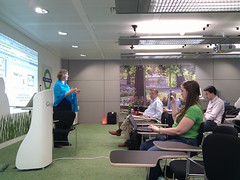 I spent yesterday camped out at the Googleplex in Victoria, taking part in a hack day Rewired State were running to support UK Online centres.
I spent yesterday camped out at the Googleplex in Victoria, taking part in a hack day Rewired State were running to support UK Online centres.
UK Online is an organisation with a straightforward remit: there are many practical and social benefits to being online, and there's a significant number of folks in the UK who never get these benefits - either because they've never made it online, or because they're net.illiterate. It's not just about lack of access: 10% of these people live in a household which has an internet connection.
The goal of the day was to improve and drive usage of the search facility which the UK Online site provides, letting visitors find their nearest centre, and to get the data underlying this search improved. Mr Thorpe and Sym Roe had prepared for the day by providing APIs onto the centre data, and this made a huge difference to our productivity: everyone was immediately able to poke around and start building on top of their great work.
I ended up working on a couple of things: making the search facility accessible by text message and by a telephone call.
In a team with Premasagar Rose, Daniel Morris, and Sym, we produced a mobile-accessible version of the search facility: text in your postcode to a shortcode and get some info back on your nearest centre. We used the excellent Taykt service to put this together, and you can give it a go by texting "UKONLINE BN14EW" (or whatever your postcard is) to 82958. There is a 25p charge for each time you text in; it's best for UK Online if the cost of this is carried by the end-user.
I hadn't done any real development for some time, and wasn't feeling too confident when I fired up Eclipse... so I opted to work on a teensy little piece of this app which was pretty simple, and pressed a few buttons for me.
It really bugs me when you text into a shortcode and get back lumpy, unhelpfully worded responses which clearly have been spat out of a database. We've known for a while now that people treat computer systems as though they were people, and I've seen this first-hand when trawling through records of text messages people have sent in for mobile services that we run. There's an awful lot of conversational stuff in there from folks who clearly think there's a human being sitting at the other end of that shortcode.
And if your users think you're a human being and will treat you like one, does it not make sense to act like one? If someone texted me to ask for the details of a nearby pub, I might give them a little more than "Park Crescent, 01273 604993"; I might mention that there's no parking nearby, that there's amazing Thai food available until 10pm or that there's a rather nice lemony beer there. I wanted to try and bring a sense of this to the results that anyone texting in to find their nearest centre would get back.
With a single text message topping out at 160 characters, and with a huge variance in the lengths of names and addresses of the centres, the content of messages was going to vary. A short conversation with the UK Online folks revealed that the most important stuff, by far, was the name of the centre and its telephone number. The full address was less necessary: centres would rather have people call up before popping in, and many local visitors would know the centres by name. Equally, opening hours (which we had previously thought might be really important) were not so useful, mainly because of a lack of confidence from UK Online as to how up-to-date the data was.
In the end I managed to drag together a small Groovy script which took a CSV of the centre data, cleaned it up a bit (capitalising names properly, removing centre names duplicated in addresses, etc.) and spat out the best-possible-message for each. Sym then took this and merged it back in with his RESTful API. This "best possible message" could include the centre name, full address, instructions to find it, car parking details, creche and cafe facilities - it depends what we have available and how long the entries for each are. Best case you'll get a result like "Oaks Millennium Technology initiative (OMTI), 105 Farm Rd, Barnsley. Housing estate. Limited on street car park. Cafe. Call 01226 215 829". Worst case, it'll be something like "Shirley Library, Church Road, Solihull. Call 0121 744 1076". Zero rocket science involved, but it scratched an itch for me.
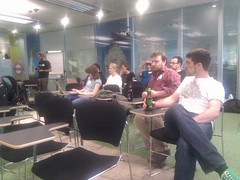 I had a couple of hours spare between finishing this off and the hack demos deadline, plus I was feeling a bit more upbeat, so I turned to a service Chris had mentioned early on. Twilio is a nice webby API for scripting voice systems; you bind a phone number to a URL and can then script the messages someone dialling that number hears, gather audio recordings or keystrokes from them, and so on. I decided to plug this into the search API which Sym had produced, and was shocked at how straightforward it was: within about 90 minutes I had a simple app on App Engine which would welcome callers, prompt them to type in a city name, search for it and read out the results.
I had a couple of hours spare between finishing this off and the hack demos deadline, plus I was feeling a bit more upbeat, so I turned to a service Chris had mentioned early on. Twilio is a nice webby API for scripting voice systems; you bind a phone number to a URL and can then script the messages someone dialling that number hears, gather audio recordings or keystrokes from them, and so on. I decided to plug this into the search API which Sym had produced, and was shocked at how straightforward it was: within about 90 minutes I had a simple app on App Engine which would welcome callers, prompt them to type in a city name, search for it and read out the results.
Twilio and their API was very simple to work with. The only icky bit was turning a phone keypad into something suitable for entering letters, to let callers type in a town name: the Twilio APIs tell you what digits someone has typed ("53937" for Lewes, say), but no more. I can't decide whether the approach I took was elegant or disgusting: I grabbed a list of UK city names from the Geonames site, then then wrote a bit of code which takes this list plus a sequence of digits, and removes all the city names which couldn't have been typed by that sequence. So, if someone has typed in the digit "2" as their first letter, we know the city name must start with A, B or C - and all others can be removed. Repeat this for all digits, and you very quickly whittle through all possible cities. It's like predictive text, but made out of cardboard boxes and sticky-back plastic, and I was pleased to get a chance to do a miniscule bit of TDD when putting it together.
You can try out the service by calling +12052898881; sorry, Twilio only do US numbers so far, but I think you could hook up a Skype forwarder to them. The voices definitely need improvement, I think - the text-to-speech engine Twilio currently uses is frequently hard to understand.
The demos were good fun. I was particularly humbled at the polished presentation which Chris and his team had given to their web app, designed to give net.illiterates who might find the open blankness of the Google search page intimidating, a good "first reason to go online".
All in all, a good day. I stumbled back onto the London/Brighton line, tired but happy.